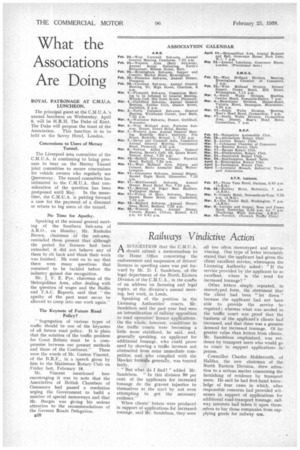Railways Vindictive Action'
Page 44

If you've noticed an error in this article please click here to report it so we can fix it.
A SUGGESTION that the C.M.U.A.
should submit a memorandum to the Home Office concerning the endorsement and suspension of drivers' licences in speeding cases was put forward by Mr. 0. 1. Sandelson, of the legal department of the North.Eastern Division of the C.M.U.A.., in the cout§e of an address on licensing and legal topics, at the division's annual meeting, last week, in Leeds.
Speaking of the position in the Licensing Authorities' courts, Mr. Sandelson said the past year had seen an intensification of railway opposition to road operators' licence applications. On the whole, however, conditions in the traffic courts were becoming a little more stabilized, he said, and, generally speaking, an applicant for additional tonnage. who could prove need by showing a traffic increase not abstracted from some immediate competitor, and who complied with the Hawker formula generally, was treated fairly.
But what do I find? " added Mr. Sandelson. " In this division 90 per cent. of the applicants for increased tonnage do the gravest injustice to themselves at the start by not even attempting to get the necessary evidence."
When clients' letters were produced in support of applications for increased tonnage. said Mr. Sandelson, they were all too often stereotyped and unconvincing. One type of letter invariably stated that the applicant had given the client excellent service, whereupon the Licensing Authority asked: "If the service provided by the applicant be so excellent, where is the need for increased tonnage?"
Other letters simply repeated, in stereotyped form, the statement that the client had been "let down because the applicant had not been able to provide the service he required ; whereas what was needed in the traffic court was proof that the business of the applicant's clients had increased, and that there was a genuine demand for increased tonnage. Of far greater value than letters from clients. Mr. Sandelson emphasized, was evidence by transport users who would go to court to support applications person.
Councillor Charles Holdsworth, of Halifax, the new chairman of the North Eastern Division, drew attention to a serious matter concerning the furnishing of evidence by transport users. He said he had first-hand knowledge of four cases in which, after responsible concerns had provided witnesses in support of applications for additional road-transport tonnage, railway interests had taken it upon themselves to bar those companies from supplying goods for railway use.
































































































